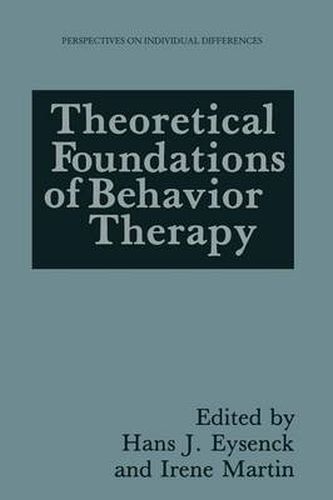Readings Newsletter
Become a Readings Member to make your shopping experience even easier.
Sign in or sign up for free!
You’re not far away from qualifying for FREE standard shipping within Australia
You’ve qualified for FREE standard shipping within Australia
The cart is loading…






This title is printed to order. This book may have been self-published. If so, we cannot guarantee the quality of the content. In the main most books will have gone through the editing process however some may not. We therefore suggest that you be aware of this before ordering this book. If in doubt check either the author or publisher’s details as we are unable to accept any returns unless they are faulty. Please contact us if you have any questions.
In this book we have attempted to confront a number of issues that are intimately related to the theoretical basis of behavior therapy. We believe that behavior therapy is an extremely efficient procedure for the treatment of neurotic disorders; that it is based on certain principles derived from learning theory; and that it is unique in using basic scientific principles in psychology in the service of applied and practical ends. We believe that we are here dealing with much more than the advantageous use of serendipitous borrowings from nonexistent principles, the cookbook collection of precepts, methods, and working rules that happen to have lasting effects. We also believe that there is truly a general principle unde. rlying behavior therapy, rather than a varied mass of nonintegrated therapies that have little in common other than a name. These beliefs are often contes ted, but usually those who oppose them do so on the basis of misconceptions and misunderstandings that indicate a lack of knowledge of fundamental facts. It is the purpose of this book to remove these misconceptions and misunderstandings, and to bring up to date our knowledge in certain fundamental areas of learning theory, behavior therapy, and the biological foundations of per sonality and individual differences. There are three major groups of misconceptions and misunderstandings. The first of these relates to beliefs held by many psychiatrists and cognitive psychologists relating to behavior therapy.
$9.00 standard shipping within Australia
FREE standard shipping within Australia for orders over $100.00
Express & International shipping calculated at checkout
Stock availability can be subject to change without notice. We recommend calling the shop or contacting our online team to check availability of low stock items. Please see our Shopping Online page for more details.
This title is printed to order. This book may have been self-published. If so, we cannot guarantee the quality of the content. In the main most books will have gone through the editing process however some may not. We therefore suggest that you be aware of this before ordering this book. If in doubt check either the author or publisher’s details as we are unable to accept any returns unless they are faulty. Please contact us if you have any questions.
In this book we have attempted to confront a number of issues that are intimately related to the theoretical basis of behavior therapy. We believe that behavior therapy is an extremely efficient procedure for the treatment of neurotic disorders; that it is based on certain principles derived from learning theory; and that it is unique in using basic scientific principles in psychology in the service of applied and practical ends. We believe that we are here dealing with much more than the advantageous use of serendipitous borrowings from nonexistent principles, the cookbook collection of precepts, methods, and working rules that happen to have lasting effects. We also believe that there is truly a general principle unde. rlying behavior therapy, rather than a varied mass of nonintegrated therapies that have little in common other than a name. These beliefs are often contes ted, but usually those who oppose them do so on the basis of misconceptions and misunderstandings that indicate a lack of knowledge of fundamental facts. It is the purpose of this book to remove these misconceptions and misunderstandings, and to bring up to date our knowledge in certain fundamental areas of learning theory, behavior therapy, and the biological foundations of per sonality and individual differences. There are three major groups of misconceptions and misunderstandings. The first of these relates to beliefs held by many psychiatrists and cognitive psychologists relating to behavior therapy.